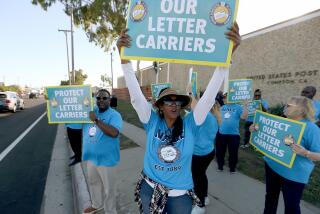Even Pentagon Can’t Torpedo This Fan Mail
- Share via
FAYETTEVILLE, N.C. — In a dark and drafty double-wide trailer, moored in the cotton and tobacco country outside town, a rumpled man with silver stubble on his chin could be found one mid-January day trying to hold together a piece of the world as it once was -- before Sept. 11, 2001.
His intentions were benign, but his prospects uncertain.
Seven years ago Ben Wiser, a 59-year-old former office worker, took over the operation of a program that circulates letters of support from Americans to military service members.
He traces the campaign to the 1960s when, as a counterstroke to the antiwar movement, volunteers devised a plan to flood the troops with fan mail.
After the war, the program continued under various names and evolved into a nonprofit organization known as Friends of Our Troops, which, according to Wiser, funneled half a million cards and letters last year alone. That’s a lot of mail.
Wiser explained how it works. Americans, often classes of schoolchildren or church groups, crank out letters of appreciation to unspecified members of the military and send them to his Fayetteville post-office box.
Then he and a small corps of volunteers -- many of them spouses of soldiers stationed at nearby Ft. Bragg -- sort through the mail, building bundles to be forwarded to bases, ships and military hospitals.
Return addresses are included, and sometimes service members write back. Pen-pal relationships and even romances have bloomed. Wiser’s Web site lists laudatory mentions in publications ranging from Leatherneck magazine to True Romance.
Correspondents pay anywhere from 12 cents to a quarter for each piece of mail. This, Wiser said, covers expenses and allows him to live in somewhat less-than-lavish style in an adjoining trailer.
On the morning I visited, the Christmas rush had ended, giving Wiser and Co. a few weeks’ respite before the Valentine’s Day campaign. After that, he said, would come the “Christmas in July” mailings.
“We don’t really ever stop,” he said. “But during the peak times it can be eight days a week, 30 hours a day.”
The trailer was stuffed with boxes of mail -- boxes stacked on shelves, boxes set in hallways, boxes leaning against walls.
Packaging tape, envelopes, address lists and assorted other office supplies were scattered everywhere. The place had a sort of Santa’s workshop feel to it -- that is, if Santa had chosen to set up shop amid a cluster of trailers in the land of cotton.
There’s a method to the sorting process, Wiser said, and he explained it in some detail. It need not be repeated here. It’s enough to know that the mail comes in from across America, and the mail goes out around the world.
At least that’s how it has worked for years.
Now comes the dilemma.
The Department of Defense no longer approves of Wiser’s mail campaign. He received a call a month ago from someone in the military’s mail division.
“They told me to cease and desist,” he said.
Was it a request or a demand?
“It was more like a demand.”
After the terrorist strikes of Sept. 11, and the subsequent and still-unresolved mailing of anthrax-laced letters, the military concluded that mass-mail campaigns like the one Wiser runs -- and there were many smaller operations underway across the land -- no longer were acceptable. As a spokeswoman said, “Policy changed.”
Letters sent for random consumption to military installations would no longer be delivered. Operation Dear Abby -- a mail-circulating campaign started by the advice columnist years ago -- was suspended, along with the military’s own “Any Servicemember” program. In their place, Web sites were created to allow mass expressions of support through e-mails.
“But an e-mail,” Wiser said, “is nothing like a letter. How many times can you read an e-mail that says, ‘We support you,’ the same e-mail over and over again?”
He had moved to an office in a corner of the trailer. It contained a space heater, which didn’t warm the room so much as make it slightly less cold.
He began to open letters that had missed going out with the Christmas batch -- a long letter from the wife of a Navy officer, a card from a family in Virginia, and a note written in large block letters and decorated with a drawing of a dog wearing a halo.
“DEAR MILITARY FRIEND,” it began, “I’M IN 4TH GRADE IN NEW MILFORD, CT. I HOPE YOU HAVE A GREAT, GREAT CHRISTMAS!!! ALSO, SEE YOUR FAMILY REAL SOON!!! JESSICA.”
Wiser said he initially decided to bend to the military’s wishes and shut down. “I sat here one night just crushed. We had worked on this for seven years, and that would have been the end of the line. No way to start it up again. Then I thought, ‘Well, it just doesn’t seem right.’ So I contacted some places overseas, I don’t want to say where, and the response was, ‘By all means, keep sending us the mail.’ ”
So he did. To sidestep the new policy, Wiser began the slow process of building a list of service members known to be stationed abroad. Bundles now would be addressed to these individuals, who hopefully would pass the letters around to comrades.
In January 2002, Wiser received an e-mail from a Marine that, in his mind, affirmed the decision to press ahead. He reached for a printout and began to read:
“One of my fellow Marines recently received a package from you filled with mail from the States. I want to personally thank you for all your efforts and contributions you have made to help us through the tough times. Could you please send more of these heartfelt letters.... We can’t get enough of them.”
He handed over the paper. “That,” he said, “is what keeps me going. ‘Can’t get enough of them,’ that’s what this young Marine said.”
Wiser said he is not blind to new realities. Since the anthrax scares, he inspects incoming mail more carefully before resending it abroad. Still, he knows, the Department of Defense remains unhappy. Not all of the bundles get through, and he has taken to affixing a stamp on each, which cites federal law and warns: “Whoever knowingly or willfully obstructs or retards the passage of the mail ... shall be fined.”
And he plans to carry on -- with or without approval from the military’s “Beltway bureaucrats,” as he calls them. “They can’t order us to do anything,” he said. “They work for us. We don’t work for them.”
And there it stands. No doubt there will be those who agree with Wiser that the Pentagon overreacted, that if fourth-grade girls can’t send fan mail to the troops then the terrorists, as the overworked saying goes, have already won.
The counterpoint, of course, is that there’s a war on after all -- a strange, new kind of war in which commercial jetliners and letters printed in what looks like a child’s hand can turn out to be lethal weapons. Adjustments must be made.
In any case, Wiser began bundling Valentines late last week.
More to Read
Sign up for Essential California
The most important California stories and recommendations in your inbox every morning.
You may occasionally receive promotional content from the Los Angeles Times.













